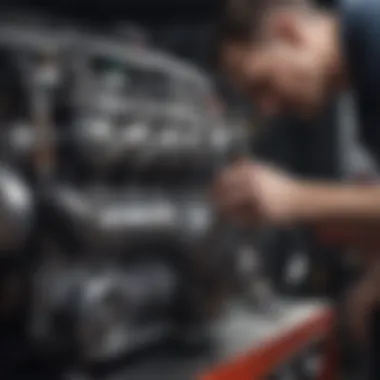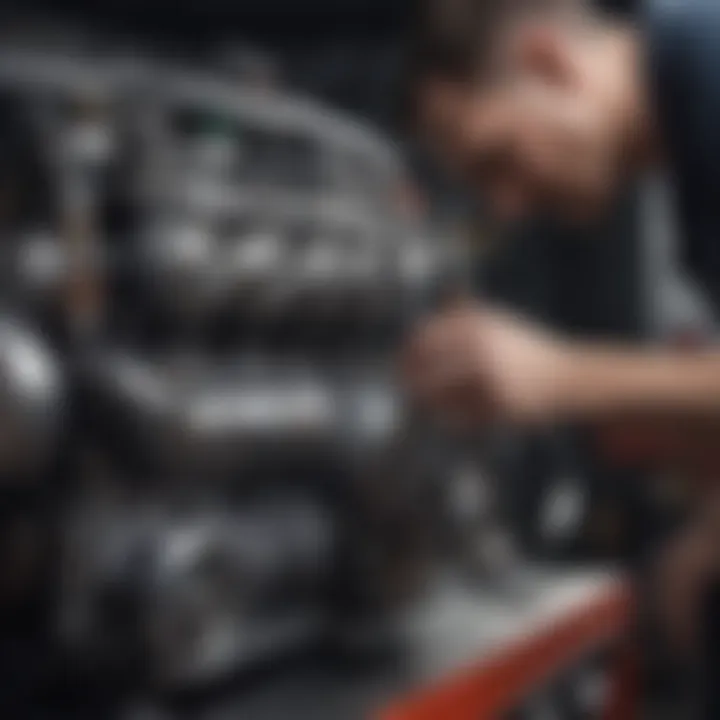Gas Additive for Old Gas: Benefits and Applications


Intro
As the automotive industry continues to evolve, the impact of fuel technology on vehicle performance demands attention. Older gasoline formulations, once standard, are increasingly considered insufficient for today's vehicles. This oversight can lead to detrimental effects on an engine's health. The introduction of gas additives specifically designed for older fuels offers a crucial solution. These additives play a significant role in restoring engine performance, optimizing fuel efficiency, and extending the lifespan of engines that still rely on vintage gasoline mixtures.
Understanding the composition, benefits, and applications of these gas additives is vital for car enthusiasts, casual drivers, and professionals alike. By delving into these aspects, this article seeks to equip readers with the knowledge required to make informed decisions regarding fuel choices and maintenance strategies.
Automotive Features and Innovations
Overview of Latest Technologies
The automotive industry is witnessing a substantial shift toward innovations that enhance engine efficiency and performance. While much focus is on modern fuels and powertrain technologies, older gasoline still has a role. Gas additives formulated to rejuvenate this older fuel are a response to the challenges faced by classic and vintage vehicles. These additives often contain detergents, stabilizers, and octane boosters, which work together to clean fuel systems and improve combustion processes.
Practical Applications of Gas Additives
Using gas additives can significantly benefit older gasoline engines. When these additives mingle with aging fuel, they enhance the fuel's volatility, ensuring the engine can achieve optimal performance. They also reduce residue buildup, addressing common issues such as knocking, pinging, and poor fuel combustion.
- Stabilizes Fuel: Prevents oxidation and degradation.
- Cleans Fuel System: Removes deposits from injectors and valves.
- Boosts Octane Rating: Improves combustion efficiency.
According to automotive experts, using a gas additive tailored for older gasoline can lead to a marked increase in engine responsiveness and longevity.
Key Considerations for Enthusiasts
Car enthusiasts who own classic or vintage vehicles may find that using these additives is essential for the maintenance and performance of their engines. Factors such as fuel quality, environmental conditions, and engine specifications will dictate the effectiveness of a particular product. Familiarity with these variables ensures optimal results when choosing a gas additive.
Maintenance Tips and Best Practices
Regular Maintenance Schedules
Adhering to a structured maintenance schedule is crucial for keeping older engines in optimal working condition. This includes regular inspections and fuel system cleaning, which can be supplemented by the periodic use of gas additives.
DIY Repair Guides
For the hands-on car owner, understanding how to apply gas additives is an essential skill. It’s relatively straightforward; simply add the recommended amount into the fuel tank before filling up. Always follow manufacturer instructions for the specific product to ensure proper use.
Addressing Common Issues and Solutions
Older gasoline can lead to several issues, such as:
- Stalling: Often caused by fuel degradation.
- Poor Fuel Economy: Results from inefficient combustion.
- Engine Vibrations: Indicates potential mechanical problems.
In these scenarios, using a gas additive can provide a quick remedy by restoring fuel quality and enhancing engine performance.
Epilogue
The integration of gas additives for old gasoline presents a practical approach to addressing the challenges faced by older vehicles in a world dominated by modern fuels. By understanding how these additives work and their applications, car owners can prolong the life of their engines while improving performance. In a market continually shifting toward advanced technologies, knowledge of gas additives remains pertinent, ensuring that vintage automobiles can partake in the narratives of the evolving automotive landscape.
Intro to Gasoline Aging
Understanding how gasoline ages is crucial for anyone utilizing older gasoline formulations, particularly in today’s automotive landscape where efficiency is paramount. Over time, gasoline undergoes a complex degradation process which can significantly impact its performance and suitability for engine use. Recognizing the implications of aging fuel encourages both car enthusiasts and everyday users to pay attention to the quality of the gasoline they are using, ensuring optimal performance.
Chemistry of Fuel Degradation
Gasoline is a complex mixture, primarily composed of hydrocarbons along with various additives. Once produced, it begins to degrade due to several factors such as oxygen exposure, temperature fluctuations, and moisture intrusion.
As gasoline ages, it forms deposits like gum and varnish, which can clog injectors and filters. Chemical reactions, including oxidation, also lead to the formation of acidic compounds. These products cause corrosion in the fuel system, diminishing the fuel's combustibility and overall performance.
Proper understanding of these chemical processes can direct users on how to manage gasoline storage and usage, emphasizing the need for periodic fuel assessment.
Identification of Old Gasoline
Identifying old gasoline is essential for any vehicle owner wishing to maintain engine health. Some key indicators include:
- Color Change: Fresh gasoline typically has a light, amber color. If it appears darker or opaque, it may have begun to degrade.
- Odor: Gasoline has a distinct scent. An unusually sour or pungent odor can indicate the presence of stale fuel.
- Separation: If you notice any separation of layers within the gasoline, that suggests contamination or degradation.


Technological tools like fuel testers can further assist in determining fuel quality. Regular inspections of gasoline can prevent damage to engines and ensure reliability while driving. Recognizing these signs will help avoid costly repairs stemming from degraded fuel.
What Are Gas Additives?
Gas additives play a crucial role in enhancing the performance of fuel, particularly for older gasoline formulations. They serve not only as enhancers for combustion but also help in maintaining the integrity of the fuel and the health of the engine. As gasoline ages, its properties can degrade, leading to a variety of operational issues. Understanding what gas additives are and their specific benefits will provide substantial insight for car owners and enthusiasts alike.
Types of Gas Additives
Gas additives come in several forms, each designed to serve a unique purpose. Here’s a detailed look into some common types:
- Detergents: These additives help clean the fuel system, preventing deposits from forming on injectors and combustion chambers. A cleaner engine runs more efficiently.
- Octane boosters: Increasing the octane rating can enhance the fuel’s resistance to knocking. This is particularly beneficial for older engines, which may require higher octane to perform optimally.
- Stabilizers: These are essential for preventing fuel degradation over time. They help maintain the quality of gasoline, especially when stored for extended periods.
- Corrosion inhibitors: Designed to protect against rust and corrosion, these additives help prolong the life of fuel tanks and fuel lines, a common concern with old gasoline.
Each type of gas additive has its role, and selecting the right one depends on the specific needs of the vehicle and its intended usage.
Purpose of Gas Additives
The purposes of gas additives extend beyond mere enhancements; they provide essential benefits to both the engine and the fuel. Here are some primary purposes:
- Enhancing Fuel Performance: Gas additives improve combustion efficiency. Better performance translates to increased power and less fuel consumption.
- Restoring Fuel Stability: Often, old gasoline loses its volatile components, making it less effective. Additives help restore these properties, rejuvenating aging fuel.
- Preventing Engine Damage: Accumulation of deposits in engines can lead to significant mechanical problems. Additives help mitigate these risks by keeping the fuel system clean.
- Environmental Benefits: By improving combustion efficiency, gas additives can help reduce harmful emissions from older engines.
"Using gas additives is not just a maintenance step; it's an investment in engine longevity and performance."
Why Use Gas Additives for Old Gas?
Using gas additives specifically designed for old gasoline is essential for maintaining the performance of both vintage and more recent vehicles. This topic is vital for car owners who may encounter issues with aging fuel, which can lead to decreased engine efficiency and potential damages. Gasoline does not retain its optimal properties indefinitely, and the introduction of additives can effectively restore its characteristics, ensuring that engines perform as intended.
One must consider the various benefits associated with these additives. They are formulated to improve the quality of old gas, addressing common problems caused by degradation. By employing these products, car owners can elongate the life of their fuel and by extension, the vehicles themselves. This area deserves close attention, as the implications of neglecting old gasoline can escalate quickly, resulting in unnecessary costs and repairs.
Restoration of Fuel Integrity
Gasoline quality diminishes over time due to various factors, including exposure to air and moisture. During this aging process, volatile compounds evaporate, which impacts fuel's combustion properties. An effective gas additive helps in restoring fuel integrity by reintroducing stabilizers and compounds that may have been lost. They work to slow oxidation and microbial growth that can create deposits inside the fuel system.
The restoration process can lead to:
- Improved combustion efficiency.
- Reduced knocking and pinging.
- More reliable starts and smoother idling.
Ensuring the integrity of old gasoline through the use of additives not only aids performance but also fosters greater fuel economy. Enthusiasts and everyday users alike can benefit from a return to optimal engine function, reducing the frequency of trips to the service station.
Prevention of Engine Damage
Old gasoline can cause significant harm to engine components if not addressed properly. When fuel begins to break down, it can form varnish and sludge, which may clog fuel lines, filters, and injectors. Over time, this can lead to severe engine problems, including reduced power output, rough running, and eventual failure.
Gas additives play a crucial role in preventing such damage. They help to clean the engine components by breaking down and dissolving these deposits, creating a cleaner fuel system overall. Important benefits include:
- Minimized wear on engines: By maintaining cleanliness, wear and tear is significantly reduced.
- Reduced emissions: Clean engines operate more efficiently, leading to lower emissions and potentially falling within regulatory standards.
- Cost savings: Regular use of gas additives can mitigate extensive repair costs associated with engine damage from degraded fuel.
The Composition of Gas Additives
Understanding the composition of gas additives is fundamental to grasping their benefits and applications. This knowledge allows car owners to select suitable products while ensuring effective restoration and maintenance of their fuel systems. Gas additives contain a blend of active ingredients tailored to combat the effects of aging gasoline, thereby enhancing engine performance and longevity.
Detergents and Cleaners
Detergents are essential components of many gas additives. Their primary role is to remove deposits and carbon build-up that accumulate over time in an engine. These deposits can form on injectors, valves, and combustion chambers, which can negatively impact fuel atomization and combustion efficiency. By incorporating detergents, gas additives can help restore the engine's functionality to its original state.
Effective detergents include polyetheramine, which actively cleans while preventing further deposition. The use of such additives not only cleans existing deposits but also reduces the likelihood of new build-up, maintaining optimal engine performance.
Moreover, cleaners work by breaking down complex hydrocarbons present in old gasoline. This ensures better fuel flow and reduces the chances of misfire or stalling, which can be detrimental to engine health. Using a gas additive enriched with quality detergents can make a significant difference, particularly for older engines that rely on antiquated fuel formulations.
Stabilizers and Corrosion Inhibitors
Stabilizers and corrosion inhibitors play a pivotal role in protecting fuel quality. They serve to extend the shelf life of gasoline and prevent the degradation of its chemical composition. Stabilizers effectively hinder the oxidation process that older gasoline is prone to, thus preserving its combustibility.
Corrosion inhibitors are critical for safeguarding metal components within the fuel system from rust and corrosion. Old gasoline can lead to moisture accumulation, which accelerates corrosion. Incorporating additives with corrosion inhibitors such as tri-n-butyl phosphate helps mitigate such risks. This is particularly important for fuel tanks and fuel lines, where exposure to moisture can lead to severe damage over time.
The combination of stabilizers and corrosion inhibitors ensures that when old gasoline is used, the risk of engine damage is minimized. Therefore, selecting a gas additive with these components is vital for car owners aiming to prolong the life of their engines and maintain their performance, even when dealing with aged fuel.


Gas additives rich in detergents and corrosion inhibitors are essential for restoring and maintaining the integrity of old gasoline when it is used in engines.
Understanding these components gives a practical perspective on how gas additives function. It enables car owners and automotive enthusiasts to make informed choices about product selection to achieve the best results for their vehicles.
Application of Gas Additives
Gas additives play a key role in rejuvenating older gasoline and ensuring that it functions efficiently in modern engines. Their application is particularly important for car owners who may encounter the challenges of using aging fuel. Old gasoline is often prone to deterioration, which can lead to significant engine issues if left untreated. Therefore, understanding how to apply these additives effectively is essential for maintaining engine performance.
How to Use Gas Additives Effectively
To maximize the benefits of gas additives, one must follow certain steps during application. First, shake the additive bottle well before use. This ensures that all components are well mixed. It is best to add the gas additive to the fuel tank before filling it with gasoline. This approach blends the additive with the fuel, enhancing its effectiveness upon combustion.
After mixing, fill the tank and allow the vehicle to run for a few minutes. This process helps in circulating the additive throughout the fuel system. Regular use of the additive after each refueling can maintain fuel integrity over time, especially if the vehicle does not see regular usage.
Recommended Dosages and Timing
The dosage of gas additives is a critical factor that determines their efficacy. Typically, guidelines provided by manufacturers suggest using a certain amount per gallon of gasoline. It is important to adhere closely to these recommendations to avoid the risks associated with overuse.
Consider using the additive every time you refuel your vehicle, especially if you often store gasoline for extended periods. Timing highly impacts the benefits of the additives. Using them before filling the tank or when you detect engine performance issues will result in noticeable improvements.
In summary, the application of gas additives is not merely an afterthought; it is a fundamental process for ensuring optimal engine health when using older gasoline. Effective application and proper dosage are paramount, allowing car owners to achieve the intended results while safeguarding their vehicles.
Impact on Engine Performance
Understanding how gas additives influence engine performance is crucial for anyone using old gasoline. The integration of these additives can lead to noticeable improvements in engine operation and longevity. This section will explore the short-term benefits and the long-term effects that these products have on engine health.
Short-term Benefits
When old gasoline is treated with additives, the immediate effects can be significant. Users often report smoother engine starts and improved throttle response. This is primarily due to the cleaning agents present in many gas additives. These cleaning agents help dissolve gunk, carbon deposits, and other contaminants that accumulate in the fuel system over time.
For instance, detergents included in fuel additives effectively purge deposits from fuel injectors and combustion chambers, restoring the efficiency of the engine. This results in enhanced combustion efficiency, which is vital for maximizing power output and fuel economy.
Moreover, using gas additives can mitigate issues related to engine knocking. Old fuel may not combust properly, causing knocking sounds. Additives can help stabilize the fuel's combustion properties, reducing or eliminating these noises.
- Improved starting: easier ignition of the engine
- Better throttle response: increased power delivery
- Reduction in knocking: smoother operation
Long-term Effects on Engine Health
The long-term benefits of using gas additives are equally important and often overlooked. Regular application of appropriate additives can contribute to the overall health of the engine. By continuously cleaning and protecting the fuel system, additives prevent buildup that can lead to costly repairs over time.
One effect of using gas additives is the preservation of fuel injectors and combustion chambers. Continuous exposure to degraded gasoline can lead to corrosion and wear. Anti-corrosion additives form a protective layer inside the fuel system, ensuring components remain intact and function as intended. This protection is vital for older engines that may be more susceptible to wear.
Additionally, gas additives can prolong the life of gaskets and seals. Older gasoline can degrade these components, leading to leaks or failure. By maintaining a more stable fuel environment, additives play a significant role in improving the durability of key engine parts.
"Regular use of gas additives not only improves immediate performance but also extends the lifespan of your engine components, making them a valuable investment."
- Protection against wear: enhances longevity of vital components
- Prevention of corrosion: maintains integrity of the fuel system
- Extended lifespan of gaskets: reduces the risk of leaks
In summary, understanding the impact of gas additives on engine performance—both short-term and long-term—enables car owners to make informed decisions. Regular use of these products can lead to significant improvements in engine reliability and efficiency.
Environmental Considerations
Understanding the environmental implications of using gas additives for old gasoline is essential for informed decision-making among car owners and enthusiasts. The increasing concerns around pollution and climate change amplify the need for automotive solutions that mitigate negative impacts. Gasoline aging contributes to emissions that can be harmful not only to engines but also to air quality.
Impact of Old Gasoline on Emissions
Old gasoline can lead to increased emissions primarily due to the chemical changes that occur over time. As gasoline degrades, it can produce harmful compounds like hydrocarbons and carbon monoxide. These substances contribute to air pollution, impacting both human health and the environment. The volatility of older gasoline diminishes, causing incomplete combustion when used in engines. Consequently, this results in a greater release of particulates and other emissions, which could have been reduced with fresher fuel.
By utilizing gas additives, car owners can enhance the combustion efficiency of their engines. These additives can help stabilize the fuel, enabling a cleaner burn. Here are some considerations about the impact of old gasoline on emissions:
- Increased level of carbon buildup in engines.
- Higher chances of misfiring and operational inefficiencies.
- Contribution to smog formation due to elevated hydrocarbons.
In summary, old gasoline not only affects engine performance but also has broader environmental repercussions.
Sustainability of Gas Additives


The sustainability of gas additives for old gasoline is a complex matter that involves evaluating their life cycle and overall ecological impact. Ideally, an effective gas additive should not only mitigate engine issues but should also be environmentally friendly. Many modern formulations aim to reduce harmful emissions while restoring the efficiency of old fuel.
Several factors come into play when assessing the sustainability of these additives:
- Biodegradability: Sustainable gas additives should decompose safely without harming ecosystems.
- Resource efficiency: The production of these additives should consume less energy and raw materials.
- Regulatory compliance: It is crucial for additives to adhere to environmental regulations to ensure they do not release toxic substances.
Moreover, some additives contain renewable components, making them a more viable option in the pursuit of greener solutions. Here are key points to consider:
- Explore products that boast eco-certifications.
- Investigate the manufacturing practices of additive producers.
- Understand how the use of additives interacts with local regulations on emissions.
Choosing the Right Gas Additive
Selecting the appropriate gas additive is vital for ensuring that old gasoline performs effectively. The variety of products available can make this decision daunting. However, understanding the specific needs of your engine and the formulation of the additive plays a crucial role. The right additive not only helps restore the integrity of old fuel but also promotes optimal engine function.
Several factors should be considered before making a choice. Be aware of the age and condition of the gasoline you are dealing with, as this influences the severity of degradation and the requirements for treatment. Additionally, consider the type of engine you have and its requirements, including whether it is designed for high performance or simply everyday driving. By aligning the additive's benefits with your particular situation, you can improve fuel efficiency and minimize potential damage to engine components.
Another key aspect of selecting the right gas additive is to ensure that it contains suitable ingredients for restoring aging gasoline. Look for products that include corrosion inhibitors, detergents, and stabilizers. These components help to remove carbon deposits, prevent rusting, and enhance the reliability of the fuel.
"The right additive is crucial for older gasoline engines and can transform performance and longevity."
Ultimately, being well-informed can lead to better decision-making in the realm of automotive maintenance.
Considerations for Selection
When choosing a gas additive, it is important to evaluate several considerations to ensure the product aligns with your needs. First, assess the type of problem your old gasoline presents. If the fuel is too old and has begun to degrade, you would need an additive that specifically targets the restoration of fuel integrity. Conversely, if you are merely looking to enhance performance, a different formulation may be more suitable.
Check the chemical compatibility with your engine's components as well. Some engines have specific requirements or limitations regarding additives, particularly vintage models. Evaluate any manufacturer recommendations for additives; this information can provide guidance on safe and effective choices.
Additionally, consider the dosage requirements outlined on the product label. Some additives may be more concentrated, requiring less per volume of fuel. It is economically prudent to choose an additive that maximizes its potential within the confines of your engine's fuel system.
Understanding Product Labels
Reading and comprehending product labels is essential in determining the right gas additive. Labels include valuable information about the composition of the product, along with instructions for use. Identify key elements such as:
- Active Ingredients: Understand what each component aims to address, whether it be cleaning, stabilizing, or preventing corrosion.
- Usage Instructions: Display how to properly apply the additive, including required dosage and frequency of application.
- Compatibility Notes: Information indicating which types of engines or fuels are ideal for the product can help avoid harmful mistakes.
- Expiration Dates: Pay attention to these dates, as expired products may be less effective or even counterproductive.
Understanding these labels ensures that you are not only selecting the right product but also using it optimally. By paying close attention to labels, you can avoid common pitfalls that arise from improper use or selection of inappropriate additives. This level of diligence will help preserve your engine’s health and maintain excellent performance.
Potential Risks and Drawbacks
When discussing gas additives for older gasoline, it is crucial to examine the potential risks and drawbacks associated with their use. While these products offer several advantages, overlooking their downsides can lead to unintended consequences for both performance and engine integrity. Understanding these risks empowers car owners to make informed decisions about additives that best suit their needs while mitigating possible adverse impacts.
Overuse of Additives
Using gas additives beyond the recommended dosages can lead to overuse, which may seem harmless at first glance. However, it can create unforeseen issues within the engine. Excessive amounts of additives can result in the formation of deposits that disrupt fuel flow. This can reduce the effectiveness of fuel injection systems, potentially leading to engine knocking or irregular performance. Additionally, high concentrations of certain chemicals might not mix well with the existing fuel, further complicating combustion processes.
Car owners are encouraged to follow product guidelines strictly. Monitoring the frequency of additive application can also prevent overuse. Being mindful of these factors ensures that the focus remains on enhancing fuel and engine performance, rather than hindering it.
Compatibility Issues
Compatibility between gas additives and particular engine types or fuel formulations is another area of concern. Not all additives are designed to work with every engine type. Applying a non-compatible additive can wreak havoc on the engine's components, including seals, gaskets, and fuel lines. Such damage could lead to leaks or failures, causing higher repair costs and compromising vehicle safety.
Before using any gas additive, it's imperative for users to consult product labels and possibly seek recommendations from trusted mechanics or auto specialists. This step ensures that the chosen product aligns with both the fuel type being used and the vehicle's specific engine requirements.
Key Takeaway: While gas additives can restore the performance of old gasoline, potential risks such as overuse and compatibility issues must not be overlooked to maintain optimal engine health and longevity.
End
In this article, we have explored the significance of gas additives tailored for older gasoline. The role these additives play in maintaining engine performance cannot be underestimated. They serve not only to restore the integrity of aged fuel but also to proactively avert potential engine damage. Car owners concerned about the effects of using outdated gasoline should weigh the benefits presented by these specialized additives.
Summary of Key Points
- Restoration of Fuel Integrity: Gas additives can revitalize old gasoline by breaking down residues and leaving behind cleaner fuel for better combustion.
- Preventing Engine Damage: These products minimize corrosion and ensure that engines run as intended, preventing costly repairs.
- Composition and Applications: Understanding the components of gas additives, such as detergents and stabilizers, is essential for effective use.
- Environmental Impact: Gas additives can help reduce harmful emissions linked to burning old gasoline, contributing to environmental preservation.
Final Thoughts on Gas Additives
Gasoline aging presents a challenge for car owners, particularly for those who appreciate classic vehicles or simply wish to save on fuel costs. The introduction of gas additives has revolutionized the way we approach this issue.
It's essential to choose the right additive based on specific needs. Not all products are created equal, so a careful review of labels and understanding of formulations is paramount. As car technology evolves, maintaining optimal engine health will increasingly depend on thoughtful fuel management.
Using gas additives is not just about enhancing engine capability; it is about responsible ownership. Through informed choices, we can ensure that engines run smoothly while reducing negative impacts on our environment. As the automotive landscape continues to change, staying updated on the latest advancements in gas additives will be an invaluable part of car maintenance.







